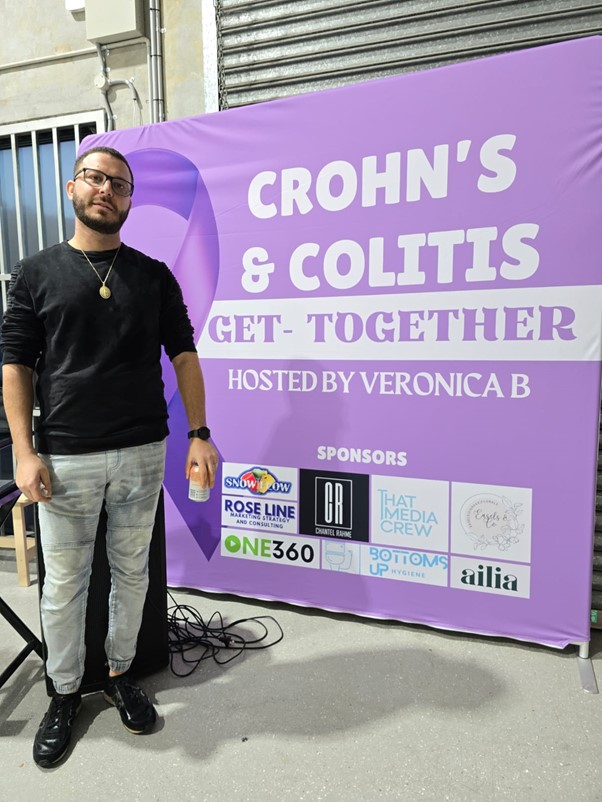I had to relearn how to walk, think and live – Elie’s story

It all started with a vengeance one spring morning – with no warning or easing in. It was my final semester of university. I woke up thinking that I was dying, with cramps that made me crouch into a foetal position from excruciating pain. Since then, I have been used a guinea pig and a medical lab for the community as a whole, trying experimental and breakthrough therapies with very little success. I had a very severe case of UC that was like a raging inferno that wouldn’t bloody quit.
Most of you will be familiar with the steroids. From weekly injections of methotrexate, to enemas and suppositories, to biologics and so many pills — being held together with drugs, I was holding on for dear life to a part of me that didn’t serve me any longer. Really, I was delaying the inevitable. Through the years, I experienced bouts of septic shock more times than I can count. Septic is a widespread infection causing organ failure and dangerously low blood pressure. With uncontrolled flares lasting over 10 years, I didn’t have remission or know what it was. I was merely surviving, not living or thriving.
The hospital was my second home, and my toilet tiles were my best friends — all 436 of them. The main event begun three years ago when I experienced a severe flare that brought me down to 62 kg. For reference I am 83kg now. On appearance, we might look perfectly fine, but I know the dark places our mind takes us to, and I still suffer from anxiety and at times PTSD.
One morning, I woke up and I couldn’t move. I barely had the energy to get my phone to call an ambulance. My heart rate was at over 160bpm — thanks to my watch for warning me and waking me up — and my sister found me close to unresponsive. I ended up at St. George Public Hospital and was put on a very high dose of hydrocortisone. At that point, I decided that I had to take my dreaded colon out. I was transferred to St. George private after one week and was stable enough to have emergency surgery. This Is when my whole life changed. I can’t sugarcoat it and tell you that it wasn’t painful or hard, but for me, the grass is greener on the other side.
The formation of my j-pouch was booked in and I was in a good state going in, but unfortunately it wasn’t as straightforward as anticipated. I had major complications after surgery, with an abscess forming silently that one night shook me into a septic episode once again. This time was different. I felt my soul leaving my body, my blood pressure dropped to practically nothing and I felt like I was in a medical drama as they pressed the emergency button, and dozens of doctors and nurses surrounded me. Thankfully I stabilised and went into another emergency surgery where I was put in a medically induced coma for five days. I had less than a five per cent chance of surviving but fortunately I am very stubborn.
Coming to my senses after waking up was surreal. I could only see blue and red for hours as my brain was rebooting. With a collapsed lung, multiple organ failures and more emergency surgeries, I was quickly told to get up by the medical staff and walk as they wanted me to expel built fluid in my lungs. It was the hardest 15 meters I have ever walked, but I found the strength and mustered up those steps. I was hospitalised for about three months. It was very difficult learning to eat and speak as I completely lost my voice. I also had to relearn how to walk, think and live with the drainage pipes attached to me. I looked and felt so numb, and I thought my reality was broken. The combination of ketamine and morphine really knocked me about.
I have one surgery to be completed which is called a take down, basically removing the stoma and connecting my small bowl to the j pouch. Understandably, I have been hesitant, but it’s booked in with the surgeon. It’s been three years since this occurred. I have a business, a wife and two dogs, and I am forever grateful that our paths crossed. My family has been a source of hope and strength. My advice is not to let anything get in your way, no matter how helpless or hard it seems. Faith , family and friends were my lifeline.
Lastly I have to thank my mum. She has been an incredible support throughout my journey with both mental health and Inflammatory Bowel Disease. Her unwavering presence, understanding, and compassion have been my guiding light during my toughest moments. From listening to my fears and anxieties, to simply being there to offer a comforting hug, her love and support have been a constant source of strength. I am endlessly grateful for her presence in my life.